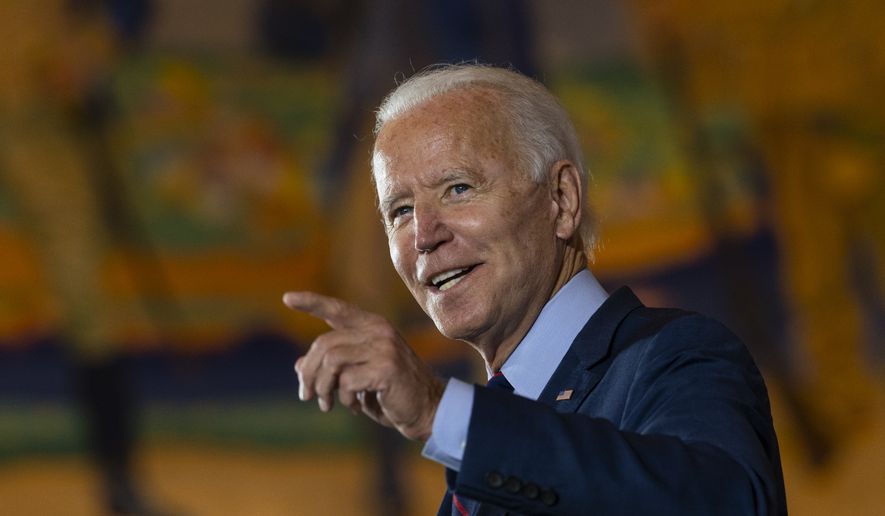Democrats agree that their court-packing plan has gained relevancy after Senate Republicans pushed through Judge Amy Coney Barrett’s confirmation to the Supreme Court. But the plan has been on the Democratic Party’s agenda for months, if not years.
Packing the Supreme Court is explicitly called for in the 2020 Democratic Party platform adopted in August, a month before Justice Ruth Bader Ginsburg died and President Trump nominated Judge Barrett to fill the vacancy.
Liberal activists argue that court-packing — from the Supreme Court down through the lower federal courts — is necessary to depoliticize the rogue behavior of Mr. Trump and Senate Republicans.
Packing the court refers to the practice of adding judges or justices to a particular court to dilute an existing judicial majority. The 2020 Democratic Party platform said if its members win elections in November, “Democrats will commit to creating new federal district and circuit judgeships consistent with recommendations from the Judicial Conference.”
In the aftermath of Justice Ginsburg’s death, liberal calls to add seats to the Supreme Court have grown louder. Senate Minority Leader Charles E. Schumer, New York Democrat, pledged that “nothing is off the table” regarding expanding the high court bench if Judge Barrett is confirmed and he wins control of the Senate in November.
Democrats trying to unseat Republican senators have leveraged the court-packing issue. Montana Gov. Steve Bullock said he is open to adding justices as a way to make courts “less political” in a recent debate opposite Republican Sen. Steve Daines.
Judicial Crisis Network President Carrie Severino said liberal attempts to reframe court-packing as a necessary reaction to Judge Barrett’s nomination amount to “revisionist history.” Ms. Severino said Democrats who describe the Senate confirmation of Mr. Trump’s judicial picks as court-packing are doing so in bad faith.
“We’re seeing people trying to use this term in a very bizarre way: to say putting people on the court that I don’t like is court-packing,” Ms. Severino said. “The bigger problem isn’t even the definition; it’s the fact that Joe Biden is refusing to say what he would do with court-packing.”
Democratic presidential nominee Joseph R. Biden is a former chairman of the Senate Judiciary Committee and labeled court-packing a “bonehead idea” in 1983. At the time, Mr. Biden said President Franklin D. Roosevelt’s 1937 proposal to expand the number of justices on the Supreme Court was constitutional and violated no law but was a bad political move.
Now, one month from the presidential election, Mr. Biden has repeatedly refused to answer whether he would look to pack the courts.
Asked last week in Nevada whether voters ought to know Mr. Biden’s position on court-packing before Election Day, Mr. Biden answered, “No, they don’t deserve.”
Mr. Trump hammered Mr. Biden’s refusal to answer questions on court-packing.
“FDR’s own party told him you cannot PACK the United States Supreme Court, it would permanently destroy the court. @judgejeanine @tedcruz But now the Radical Left Democrats are pushing Biden to do this. He has zero chance against them!” Mr. Trump tweeted Saturday.
Keep Nine, a bipartisan coalition of former state attorneys general and others advocating for keeping the Supreme Court confined to nine justices, says voters deserve to know all candidates’ views on court-packing.
Paul Summers, a former attorney general of Tennessee, said the coalition formed in 2019 as the clamor for expanding the Supreme Court grew. His group wants an amendment to the Constitution ensuring that only nine justices serve on the Supreme Court.
“Now we feel like court-packing basically destroys the independence of the Supreme Court, it denigrates the rule of law, and really does damage the checks and balances on abuse of power,” Mr. Summers said. “The judiciary is the third and separate branch of government, but it is, and it should be, nonpolitical.”
The number of Supreme Court justices has remained at nine since 1869, when President Grant signed an act of Congress cementing the number. Mr. Summers said he thinks a constitutional amendment is necessary to form a “permanent firewall” to keep the number of justices at nine.
The Keep Nine effort has some bipartisan support in Congress. Last month, Rep. Collin C. Peterson, Minnesota Democrat, and Rep. Denver Riggleman, Virginia Republican, introduced a proposal to amend the Constitution and set the number of justices at nine.
The outcome of Judge Barrett’s nomination hearing could determine whether the addition of justices to the high court is on the horizon. If Democrats follow through on their court-packing agenda, Republicans figure to throw in the kitchen sink to try to stop them.
Sen. Ben Sasse, Nebraska Republican and Judiciary Committee member, said Sunday on Fox News that Congress ought not to allow court-packing, which he labeled the “suicide bombing of two branches of government.”
• Ryan Lovelace can be reached at rlovelace@washingtontimes.com.




Please read our comment policy before commenting.